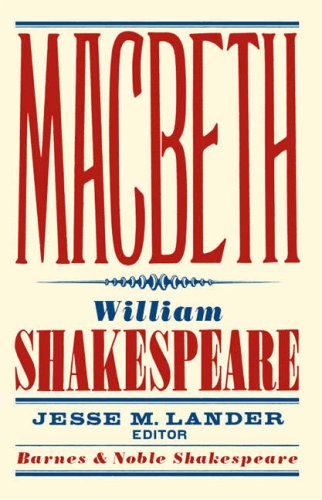 MACBETH: ...Come, seeling night,
MACBETH: ...Come, seeling night,Scarf up the tender eye of pitiful day
And, with thy bloody and invisible hand,
Cancel and tear to pieces that great bond
Which keeps me pale. Light thickens,
And the crow makes wing to th' rooky wood.
Good things of day begin to droop and drowse,
Whiles night's black agents to their preys do rouse.
Thou marvel'st at my words, but hold thee still.
Things bad begun make strong themselves by ill.
My aunt gave me a copy of Harold Bloom's Shakespeare: The Invention of the Human for Christmas. In it, Bloom professes a special love for Macbeth, and calls him the most imaginative of Shakespeare's tragic heroes. Of course, Macbeth blurs the line between real apparitions and false. Some visions, like the witches on the heath are certainly real--Banquo sees them too--and others, like the "air-drawn dagger" that Macbeth sees just before killing King Duncan are certainly imagined. Others, like Banquo's ghost, lie somewhere between.
But the fact remains that Macbeth, in all his imaginative power, is someone who knows exactly what he's getting into. From the first, he seems to understand that the actions foretold of him spell his own doom:
I am Thane of Cawdor.
If good, why do I yield to that suggestion
Whose horrid image doth unfix my hair
And make my seated heart knock at my ribs
Against the use of nature?
So why does Macbeth do it? There are many answers, none of which feel quite sufficient. The worst of these is that Macbeth is prodded to it by his more domineering wife. Yet Bloom notes also that the Macbeths present us, ironically, what may be the strongest and most equal marriage in all of Shakespeare's tragedy. For my part, I note that long after Lady Macbeth has gone mad from guilt and committed suicide, Macbeth himself remains, showing a greater reserve of inner strength which belies this explanation.
Explanations that focus on Macbeth's destiny seem also insufficient, insofar as they downplay the natural qualities in Macbeth (and Lady Macbeth) that make him agreeable to the murder of Duncan, as well as those of Banquo and the family of Macduff. Nor do they fully embrace the chicken-and-the-egg ambiguity inherent in the witches' prophecy.
Bloom's suggestion is something I would never have considered on my own. It centers around Lady Macbeth's strange assertion in 1.7:
I have given suck and know
How tender 'tis to love the babe that milks me.
We know that the Macbeths are childless; what child is this? Is it from a former marriage? Or a child that has died? In any case, there is now no child and Macbeth has no issue. It is this fact that propels his murders: The witches foretell his kingship, but also that the line of Banquo will become king afterward, supplanting the heirless Macbeth.
Children make the fear of death more bearable. Our lives are by their nature too short to accomplish all that seems to us our potential, but while our children live something of us lives, too. Macbeth's frenzy, then, may be seen as a desperate rebellion against death, to take all power unto himself though the consequences are clear. He strikes at the children of others: It is Fleance, Banquo's son, he really wants to kill, and he succeeds in murdering Macduff's son. Blood, which is suggestive of both generative and destructive power, obsesses him:
It will have blood, they say. Blood will have blood.
Macbeth's wanton violence wavers somewhere between a will to destroy the issue of others and a perverse attempt at leaving a sort of negative legacy--rather than no legacy at all--and it is worth noting that the play has at least one example of a child born from violence, Macduff, who was "from his mother's womb / untimely ripped."
But Macbeth must ultimately face the fact that his only capabilities are negative capabilities; he engenders nothing but destroys all. His most poignant moments are late in the play, after Lady Macbeth's suicide, when his imaginative powers are transmuted into a prescient clarity about his own worth. His "tomorrow, tomorrow, and tomorrow" soliloquy is the most famous of these and is possibly bettered only by Hamlet's "to be or not to be." But almost as good is this less infamous one:
I have lived long enough. My way of life
Is fall'n into the sere, the yellow leaf,
And that which should accompany old age,
As honor, love, obedience, troops of friends,
I must not look to have, but in their stead
Curses, not loud but deep, mouth-honor, breath
Which the poor heart would fain deny and dare not.
Lear's tragedy is that he spends the entire play driving himself mad thinking that he does not have what he truly does, Cordelia's love. Macbeth's tragedy is that he has never made a Cordelia, and cannot escape such truths, like Lear and Lady Macbeth do, into madness. He is instead tormented by his sanity. Finally, the only thing left for him is to go into that abyss that he has created.
Note: This will be my last book of the year. The first book I read in 2010 was King Lear. Like all things, the year begins and ends with Shakespeare...

2 comments:
For the record, I highly recommend the Barnes and Noble editions of Shakespeare that look like the one above.
Double, double, toil and trouble,
50 read, and 50 bubble.
Post a Comment